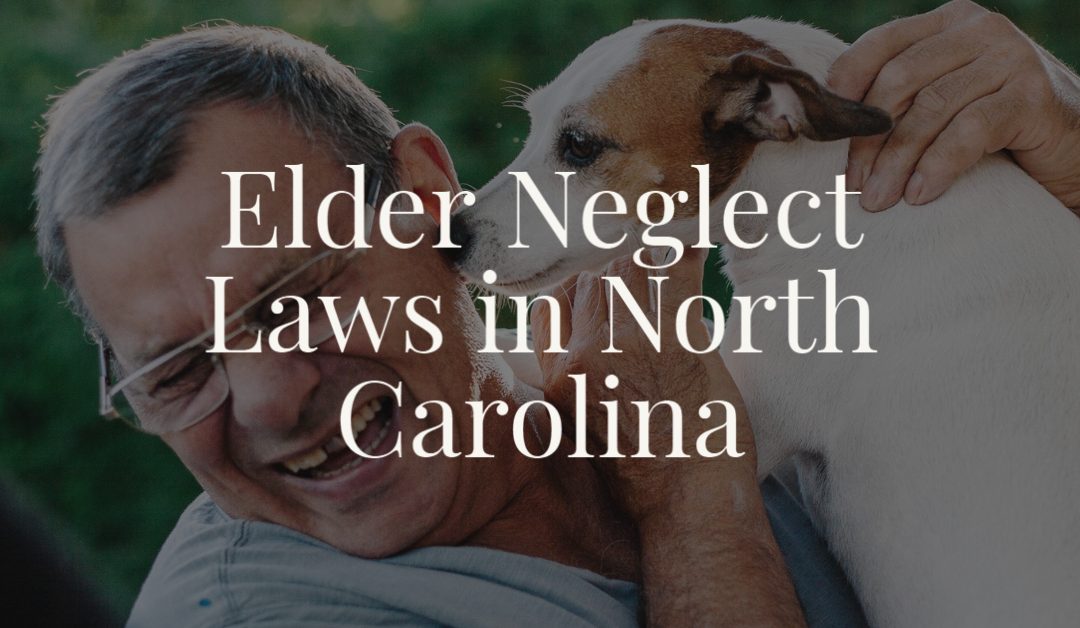Neglect of a disabled adult in North Carolina is a type of abuse. There are several ways that caregivers or others can hurt an elderly disabled adult. Exploitation is when someone takes advantage of someone’s situation and vulnerability for financial gain. The act of physical abuse is when someone inflicts pain on someone else willfully. However, elder neglect is less understood. Let’s look at what elder neglect laws exist to protect and help neglected and disabled adults.
What Is Elder Abuse?
In our state, individuals made more than 24,500 reports of abuse, neglect, or exploitation of older adults in just one year. Since 90% of abusers are family members or trusted others, neglect and abuse often go unnoticed. Forms of elder abuse include:
- Physical abuse
- Neglect
- Emotional or psychological abuse
- Verbal abuse
- Threats
- Financial abuse and exploitation
- Sexual abuse
- Abandonment (1)
North Carolina enacted the “Protection of the Abused, Neglected, or Exploited Disabled Adult Act” to protect the increasing number of disabled adults abused, neglected, or exploited in North Carolina. This act mobilizes DSS and law enforcement to act on behalf of those who cannot protect themselves.
What Is Elder Neglect?
Neglect is a common problem among the disabled older adult community, especially among the elderly. According to NC Courts, some common signs of neglect can include:
- Unusual weight loss, dehydration, malnourishment, untreated bedsores, poor hygiene
- Untreated health problems
- Hazardous living conditions (no heat or water)
- Unsanitary living conditions
- Desertion: Abandonment of an elder at a hospital, nursing facility, or public place
- Failure to fulfill a caretaking obligation
- An elder’s report of being mistreated or abandoned
Where Does Neglect Happen?
No matter where an elderly disabled person lives, neglect can happen. There are neglect cases in private homes, nursing homes, assisted living facilities, continuing care retirement communities, hospitals, and adult daycare centers. Neglect is willful abuse where a caregiver chooses to ignore the needs of a disabled adult. Neglect happens anytime a person responsible for the needs of a disabled adult chooses not to perform their necessary duties.
Who Is At Risk of Elder Neglect?
Any older disabled adult who cannot care for their own needs can suffer neglect. Depending on a caregiver to help with daily activities of life puts a person at risk. Women are more likely than men to be victims of neglect. The oldest of the old are also more likely to suffer neglect along with those who have dementia.
What Can I Do?
If you know someone who may struggle with neglect from a caregiver, there are ways to help. You can report the situation to the Department of Social Services (DSS) where the older adult lives. DSS reports cases of abuse to the prosecutor’s office.
If an older adult needs care but has no caregiver in place, you can also report their situation to DSS. In this case, DSS helps them find a better living situation.
Petitioning for Guardianship
A neglected individual is often family or a close friend. You may desire a better living situation for an elderly disabled person in your own family.
For example, your sibling may care for your mother but you notice signs of neglect. In this case, you may want to petition the court for your mother to have a legal guardian. You might ask the court for the privilege of being the guardian. If your sister is already the legal guardian, you may petition the court to change guardianship. Often, hiring an experienced elder law attorney can help you make the best case for your situation.
Another possibility might be to have your attorney draw up a durable general power of attorney. Your mother then passes all power for decision-making over to you. If you become her power of attorney, you can make the best decisions for her. You can choose to care for her yourself, hire a good caregiver, or move her into a more caring environment. Your uncaring sibling is no longer a part of her decisions if you have power of attorney.
Take Action
In many cases, you may wish to discuss the possibilities with an attorney. There are often ways to establish a durable general power of attorney to help an elderly disabled person. With a durable general power of attorney, there is also no need to petition the court for guardianship. However, you can also petition the court for legal guardianship or to change guardianship if needed. When someone you are close to needs help, you may want to explore your options with an attorney before taking action.
Whether you are the family of a neglected individual or you’ve just noticed someone in your community needing help, you can make a difference. There are ways to make your voice heard and help a disabled elderly individual find help. Contacting DSS is usually an excellent place to start if there is neglect or other abuse. However, it can also be helpful to contact an elder law attorney if you need to resolve a neglectful abuse situation in your own family.
We Can Help
Our elder law attorneys at Hopler, Wilms, and Hanna specialize in elder abuse or mistreatment cases. We work to resolve living situations for older disabled adults who need help finding a stable and safe caregiver. We also work with families to ensure senior adult family members have the best legal plans for future care. Resolving issues between family members who may disagree about the best ways to move forward is another aspect of our expertise. Contact us and find out how we can help in your unique situation.

